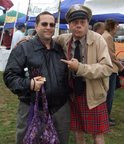The Most Dangerous Idea In Religion: One Way to God
Shouldn't be a surprise, of course, but several "spiritual leaders" were asked what the most dangerous idea in religion was. Here are their responses, as posted on the Houston Chronicle website:Violence in the name of God — Richard Land
"I would agree with Pope John Paul II, who said that there is a sacred sanctuary of the soul for each man and woman. No other human being has the right to coercively interfere with that sacred sanctuary of the soul. The most dangerous idea in religion is the idea that violent, coercive force is permissible in the name of God — any God.
Richard Land is the president of the Southern Baptist Convention's Ethics and Religious Liberty Commission. He was selected by Time Magazine in 2005 as one of the 25 most influential evangelicals in America.
Follow our rules or else — Wayne Dyer
"Carl Jung (an author and psychiatrist) had a line. The paraphrase is this: The No. 1 problem with organized religion is that the purpose of organized religion is to prevent people from having a direct experience of God. Religion is organized around the principle that religion will provide the direct experience of God for you as long as you become a member, follow our rules and contribute to us financially.
"The most important thing human beings can recognize is that they are already connected to God, and to maintain that connection is not something you can turn over to another person or organization. One of the truths of the physical world is that you must be like what you came from. If you have an apple pie and you ask what the apple pie is like, it's like (the apple) where it came from."
Wayne Dyer is one of the most popular self-help speakers in the nation. He's the best-selling author of 29 books and has been featured frequently on Public Broadcasting Service specials.
My religion is right — Rabbi Harold Kushner
"There's a sense that in order for me to be right, everyone who disagrees with me is wrong. It makes religious interfaith cooperation more difficult. If I believe that, I have to believe that other people's religions are worthless, invalid.
"You have to understand that religion is not about getting information about God. Religion is about community. The primary purpose is not to get us to heaven but to put us in touch with other people. I can have fierce loyalty to my family without denigrating other people's family. I can have fierce loyalty to my own religion without denigrating other people's religion. In the same way, my neighbor can say that my wife is the most wonderful woman in the world. I can take that as a statement of love, not fact."
Rabbi Harold Kushner is one of the most famous Jewish thinkers in the nation. He is best known for his best-selling book, When Bad Things Happen to Good People (Anchor, $21).
Converting others to your religion — Abdullahi Ahmed An-Na'im
"I wouldn't believe in a religion if I didn't believe it to be better than other religions. The notion of superiority and exclusivity is inherent to religious beliefs. It can be dangerous and not be dangerous.
"The whole idea of missionary work is a very loaded and dangerous idea because it's often presented as simply presenting beliefs for someone to accept or reject. It's always embedded in power. Those who have the ability to proselytize to others are more powerful than others. They have the resources to establish schools, hospitals. Missionary work is not neutral. It is embedded in power. You don't find Muslims coming to proselytize in the U.S. But you find Americans going to all sorts of Muslim countries."
Abdullahi Ahmed An-Na'im is an internationally recognized scholar of Islam and human rights. He is the Charles Howard Candler Professor of Law at Emory University.
A tribal view of God — Deepak Chopra
"The most dangerous idea is my God is the only true God and my religion is the only true religion. It leads to quarrels, divisiveness, terrorism, prejudice, racism and bloodshed.
"All religious ideas are programmed into our consciousness at a very early age. We hold them to be true. It's very difficult to step out of that condition even in the face of good intellectual reasoning because of emotional bondage to our condition. We bristle with emotions when our beliefs are threatened.
"We are at a very critical stage in our evolution. We're beginning to become aware. We know a lot about nature. We have a pretty good idea about the beginning of the universe. We understand to a great extent the laws of physics, chemistry and biology. And yet for the vast majority of us, though we have cell phones and can make nuclear bombs, our psychological and spiritual evolution is frozen to a level that is very tribal."
Deepak Chopra is chairman and co-founder of the Chopra Center for Wellbeing in Carlsbad, Calif. He is a best-selling author and popular lecturer best known for integrating Western medicine with the natural healing traditions of the East.


0 Comments:
Post a Comment
<< Home